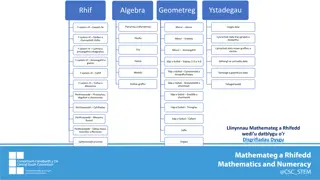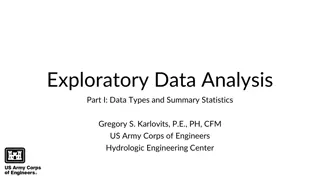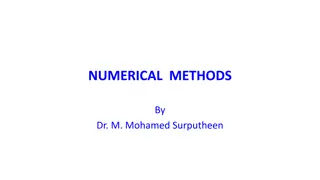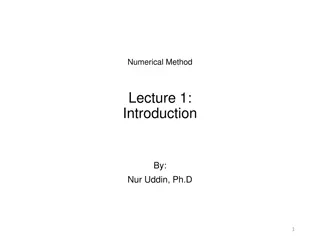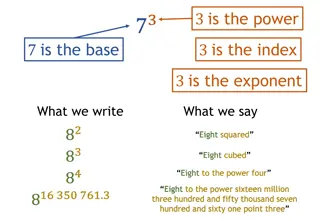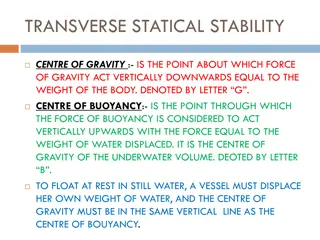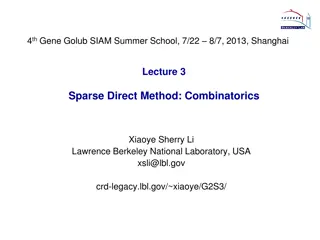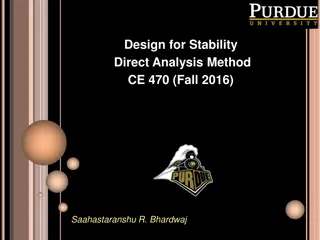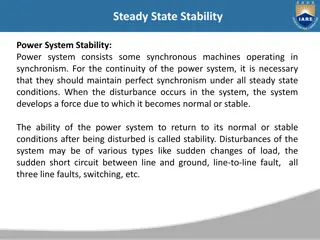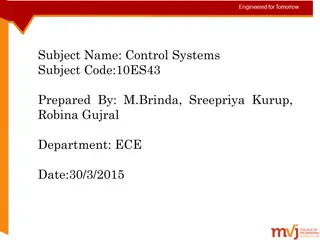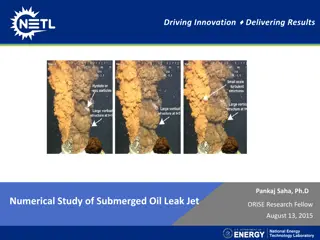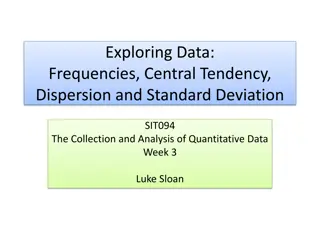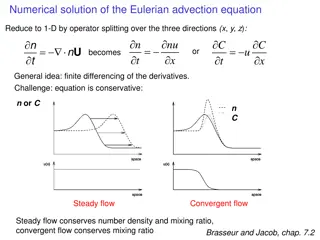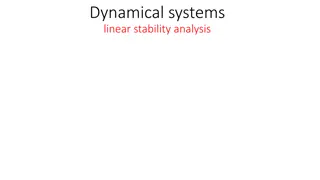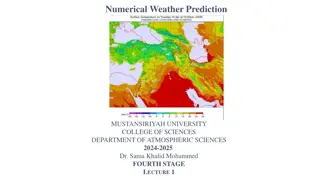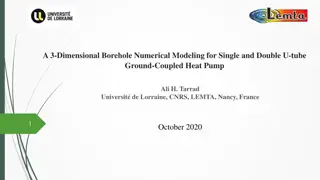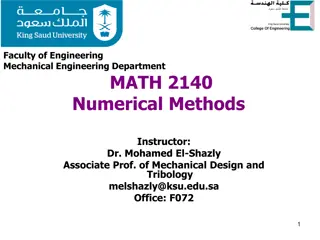And Applying Numerical Analysis in Statistics
Utilize numerical analysis techniques to interpret and manipulate numerical data effectively in various environments. Enhance your understanding of value placement in digital contexts to make informed decisions based on positioning and order. Develop skills in reading, writing, and interpreting numb
8 views • 36 slides
Data Types and Summary Statistics in Exploratory Data Analysis
Data types, including discrete numerical, continuous numerical, ordinal, and nominal, are essential in exploratory data analysis. Variables can be categorized based on their nature, such as numerical variables (interval vs. ratio) and categorical data summaries. Learn about USGS flow measurements, n
4 views • 48 slides
Numerical Methods and Errors in Computation
Delve into the world of numerical methods through the guidance of Dr. M. Mohamed Surputheen. Explore topics such as solving algebraic and transcendental equations, simultaneous linear algebraic equations, interpolation, numerical integration, and solving ordinary differential equations. Learn about
1 views • 130 slides
Introduction to Numerical Methods: A Comprehensive Overview
Numerical methods play a crucial role in solving mathematical problems efficiently through arithmetic operations. This lecture by Dr. Nur Uddin covers the fundamental concepts of numerical methods, emphasizing their importance in engineering problem-solving with the use of modern digital computers.
1 views • 17 slides
Introduction to Numpy and Scipy: Numerical Computing in Python
Numpy and Scipy provide powerful MATLAB-like functionality in Python for fast numerical computations, high-level math functions, and efficient handling of multidimensional arrays. Learn why NumPy is essential for speeding up numerical computations in Python and explore key features such as arrays, m
0 views • 47 slides
Aircraft Stability and Manoeuvrability
Exploring the principles of flight, this content covers how the stability of an airplane is maintained, the forces involved in aircraft motion, and stability objectives related to different axes of rotation and planes of movement. It also delves into the effects of dihedral and anhedral on stability
2 views • 45 slides
Numerical Expressions and Exponents Overview
This content covers various numerical expressions involving exponents, including examples of valid and invalid mathematical representations, matching worded expressions with their numerical equivalents, and identifying the correct expressions based on provided criteria.
0 views • 30 slides
Ship Stability: Centre of Gravity and Metacentre
Exploring the concepts of transverse statical stability, centre of gravity, centre of buoyancy, metacentre, stable equilibrium, unstable equilibrium, and neutral equilibrium in ship stability. The relationship between these key points determines a ship's stability and ability to maintain a steady po
1 views • 8 slides
Overview of Sparse Linear Solvers and Gaussian Elimination
Exploring Sparse Linear Solvers and Gaussian Elimination methods in solving systems of linear equations, emphasizing strategies, numerical stability considerations, and the unique approach of Sparse Gaussian Elimination. Topics include iterative and direct methods, factorization, matrix-vector multi
0 views • 35 slides
Power System Dynamics and Stability: Multimachine Simulation with Implicit Methods
This lecture covers the use of simultaneous implicit and nonlinear trapezoidal methods for solving power system dynamics and stability in multimachine simulations. Techniques such as Newton's method for resolving algebraic equations alongside differential equations are discussed, offering numerical
0 views • 28 slides
Numerical Chromosome Aberrations in Humans
Numerical chromosome aberrations involve the gain or loss of whole chromosomes, impacting the genome size and potentially leading to genetic mutations. Nondisjunction, where chromosomes fail to separate properly during cell division, can result in aneuploidy - the presence of an extra or missing chr
0 views • 18 slides
Design for Stability - Direct Analysis Method CE 470 (Fall 2016) Saahastaranshu R. Bhardwaj
Stability in structural design is crucial for the safety and performance of compression members, elements, and frames. This content focuses on the Direct Analysis Method (DAM) as a rational approach to considering stability in structural engineering. Factors influencing stability, second-order effec
2 views • 29 slides
Advanced Solutions for Concrete Dam Assessment
Utilizing advanced methods for the assessment of existing concrete dams is crucial for ensuring their stability and safety. This project focuses on analyzing the stability of small concrete dams in Norway built between 1950-1970, which may not meet current safety standards. The study involves evalua
1 views • 12 slides
Rent Increase Policy Overview by Housing Stability Council
The Rent Increase Policy established by the Housing Stability Council aims to balance financial sustainability with resident stability in affordable housing. The policy allows for rent increases up to 5%, with reviews required for higher increases. Stakeholder feedback, unique market conditions, and
2 views • 11 slides
Numerical Methods in Mathematics
Explore the world of numerical methods in mathematics, focusing on the Newton-Raphson Method and root approximations. Discover how to locate roots of equations and use iteration to enhance your problem-solving skills. Uncover the significance of numerical methods in finding solutions to complex equa
1 views • 28 slides
Power System Stability: Synchronous Machines and Dynamics
Power system stability is crucial for maintaining synchronism and continuity. It includes steady-state and transient stability, with dynamics of synchronous machines playing a key role. Different types of disturbances can affect stability, requiring a system's ability to adjust and return to normal
0 views • 73 slides
Stability Analysis in Control Systems
Stability analysis in control systems is crucial for ensuring the predictability and reliability of system responses. It involves assessing various stability criteria such as Routh Stability Criterion and investigating the behavior of systems under different conditions like bounded inputs. Understan
0 views • 29 slides
Overview of Numerical Methods in Computational Fluid Dynamics
This material delves into the properties, discretization methods, application in PDEs, grid considerations, linear equations solution, and more involved in Numerical Methods in Computational Fluid Dynamics. It covers approaches to fluid dynamical problems, components of numerical methods, and their
1 views • 40 slides
Numerical Study of Submerged Oil Leak Jet
This study focuses on a numerical investigation of a submerged turbulent oil jet, aiming to calculate the oil discharge rate despite the opaque nature of the oil. The research involves experimental test cases, CFD simulations, and analysis of large and small-scale structures in the oil-water interfa
1 views • 24 slides
Numerical Analysis of Aerodynamic Performances in Biplane Configuration
This paper presents a numerical investigation comparing single versus double wing (biplane) configurations for aerodynamic performances. Geometric models and numerical analyses were conducted, providing insights into the advantages and complexities of biplane wings. The study utilized computational
1 views • 12 slides
Quantitative Data Analysis in Research
Dive into the world of quantitative data analysis with a focus on frequencies, central tendency, dispersion, and standard deviation. Explore the collection and analysis of numerical data, levels of measurement, and methods for quantifying social concepts. Learn about the importance of capturing data
0 views • 25 slides
Math Expressions Exploration for Elementary Students
This content discusses numerical and algebraic expressions, teaching students how to match written expressions to numerical expressions, understand the concept of variables, and differentiate between algebraic and numerical expressions. It also covers basic operations like addition, subtraction, mul
0 views • 11 slides
Customising Numerical Models for Galactic Elemental Abundance Tracking
This study delves into customizing numerical models to track production of selected elemental species in a Milky Way-type galaxy. The GIZMO code by Hopkins (2015) offers versatile numerical methods, including cooling, star formation, and feedback mechanisms. The experiments focus on an isolated gala
0 views • 16 slides
Deriving numerical integration methods
Most numerical integration formulas involve a weighted average of the integrand values. One approach is to approximate the integrand with a polynomial, integrate it, and derive the integration formula. This method is demonstrated with examples such as the composite trapezoid rule and Simpson's rule.
0 views • 14 slides
Numerical Integration in Numerical Methods
This lecture covers the fundamentals of numerical integration, including upper and lower sums, trapezoid method, Romberg method, Gauss quadrature, definite and indefinite integrals, the fundamental theorem of calculus, and the area under the curve. The concepts are explained with examples and calcul
0 views • 53 slides
MATH 2140 Numerical Methods
Dive into the world of numerical methods for mechanical engineering with a focus on numerical differentiation, finite difference formulas, differentiation formulas using Lagrange polynomials, curve fitting, Richardson's extrapolation, and more. Explore how these computational techniques enhance engi
0 views • 11 slides
Numerical Representation and Unsigned Integers
Fundamentals of binary number systems, unsigned integers, and positional number systems. Understand how numerical values are represented in computer science, the range of numbers they can express, and the rules for different numerical bases. Discover the significance of bits, binary digits, and lear
0 views • 25 slides
Central Bank Independence: Retrospect and Impact on Financial Stability
Central bank independence, as discussed at the Bank of England conference, reflects on 20 years of progress and its implications for financial stability. Debelle and Fischer's research on goal dependence versus instrument independence is examined in the context of empirical data on central bank inde
0 views • 7 slides
Numerical Solution of Eulerian Advection Equation in 1-D Operator Splitting
The Eulerian advection equation is solved numerically in 1-D by operator splitting over the x, y, and z directions. The process involves finite differencing of derivatives and ensuring conservation in steady and convergent flows. Different finite-difference approximations of derivatives are discusse
0 views • 13 slides
Numerical Solutions of ODEs in Engineering
This content discusses the practical application of numerical methods for solving Ordinary Differential Equations (ODEs) in engineering problems. Starting from physical laws, it covers the generation of differential equations, numerical and analytical solutions, and techniques for solving initial va
0 views • 11 slides
Dynamical systems
A fundamental aspect in the study of dynamical systems is the analysis of linear stability, which provides insights into the system's behavior around equilibrium points. By examining the system's characteristics through linear stability analysis, researchers can determine the stability of these poin
0 views • 21 slides
Understanding Numerical Weather Prediction in Atmospheric Sciences
Numerical Weather Prediction is a crucial method of weather forecasting that involves translating fluid flow equations into computer code, integrating them based on initial conditions and domain boundaries. This field, developed in the 20th century with advancements in computing, uses meteorological
0 views • 12 slides
Understanding Stability of Fixed Points in Classical Mechanics and Electromagnetism
Explore the concept of fixed points in phase-space, their stability, and linearization for stability analysis in classical mechanics and electromagnetism. Learn how to identify stable and unstable fixed points using vector diagrams and eigenvalues. Gain insights into the motion near fixed points and
0 views • 14 slides
Numerical Integration in Ship Geometry and Design
Explore how numerical integration methods such as Simpson's 1st Rule are applied in calculating important geometric properties of ships, including waterplane area, sectional area, submerged volume, and more. Learn the steps involved in using numerical calculation for precise results in ship design.
0 views • 28 slides
Process Control Stability: Concepts, Cases, and Definitions
Explore the concept of stability in process control systems, including different stability cases such as stable, critically stable, and unstable. Understand the definition of stability as the ability of a system to provide bounded output for bounded input, known as the BIBO definition.
0 views • 31 slides
Numerical Methods for Differentiation and Integration
Explore the principles and techniques of numerical differentiation and integration in this comprehensive guide. Learn different methods like Taylor's series expansion and forward, backward, and centered differences to evaluate derivatives. Discover how to apply these numerical techniques to various
1 views • 38 slides
Borehole Numerical Modeling for Ground-Coupled Heat Pump
Explore a 3D numerical modeling study on single and double U-tube ground-coupled heat pump systems. Understand the orientation, models, case study, and dimensions. Analyze boundary conditions and numerical methods for efficient heat transfer.
0 views • 21 slides
Understanding Numerical Integration in Engineering and Science
Discover the importance of numerical integration in solving engineering and scientific problems, including applications in heat flow calculations and curve length measurements. Learn about the need for numerical integration, approaches involved, and the difference between closed and open integration
0 views • 18 slides
Understanding Financial Stability and Exchange Rate Stability
Learn about financial stability and exchange rate stability as essential monetary policy objectives. Financial stability involves a well-functioning financial system, while exchange rate stability aims for stable currency values. Discover the importance of maintaining these objectives for economic h
0 views • 7 slides
Math 448/548 Numerical Analysis Course Information
Explore the detailed course information for Math 448/548 Numerical Analysis, covering topics, assignments, evaluation criteria, and projects. Learn about MATLAB, textbook, instructor details, and more in this comprehensive overview. Prepare for quizzes and assignments while gaining insights into num
0 views • 20 slides
